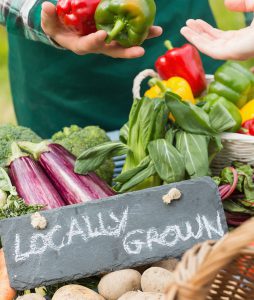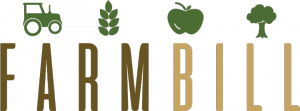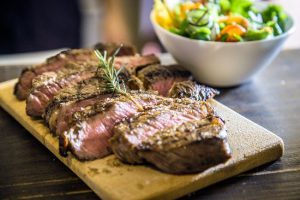Farm Bill fights heat up!

UPDATED JUNE 18, 2018
The House Farm Bill was voted down on May 17. It is expected to be brought back up for reconsideration by June 22. For the most recent alert, go to https://farmandranchfreedom.org/house-second-farm-bill-vote/
UPDATED May 17, 2018 …
The U.S. House of Representatives is scheduled to vote on the Farm Bill today, March 17! Out of the amendments we supported, only one is being allowed a floor vote — so we need you to call again, even if you have called before.
You can find out who represents you by going to www.house.gov or by calling the Capitol Switchboard at 202-224-3121.
Sample message for calls:
Hi, I’m ___ from ___. I am a __________ [farmer, local food consumer, chef.] I am calling to urge my Representative to vote yes on the Brat-Blumenauer Amendment No. 71, which would reform the Checkoff Programs so that the money doesn’t serve as backdoor funding for lobbying groups, and which provides some protections against the misuse of the money.
Add a sentence or two about why this matters to you (see next section for information on the Checkoffs). That’s it! One minute of your time, and you can have an impact.
MORE INFORMATION on CHECKOFFS
Under federal law, farmers of certain commodities (including pork, eggs, beef, and milk) are required to pay a portion of their sales into Checkoff funds. These mandatory fees are intended to be used to research and promote demand for those products. Campaigns such as “Got Milk?” and “Pork, the other white meat” are paid for by these taxes on farmers. Checkoff programs collect tens of millions of dollars from America’s farmers and ranchers every year.
Nothing in the Checkoffs promotes local, organic, or sustainable production. To the contrary, the basic message is that all the foods are interchangeable commodities; conventional CAFO beef, imported beef, and the grass-fed beef from the farmer in your town are all rolled into “Beef, it’s what for dinner.” Even worse, the dairy checkoff has used its funds – some of which are paid by raw milk farmers – to do public ad campaigns and “educational programs” for dietitians that actively oppose raw milk access.
Moreover, these funds often wind up in the pockets of industrialized agriculture trade organizations. While they can’t use the money directly for lobbying, the funding helps them grow by underwriting their overhead, travel costs, etc. – and then they are free to use their other funds to lobby against the interests of family farmers, such as by opposing country of origin labeling.
While the best solution would be to make the Checkoffs voluntary, the Brat-Blumenauer Amendment No. 71 is a very important step in reforming these programs. The amendment incorporates the Opportunities for Fairness in Farming Act, S. 741/ H.R. 1753, to prohibit lobbying, rein in conflicts of interest, and stop anti-competitive activities that harm other commodities and consumers.
More Background
We supported several other amendments to try to address problems in the House Agriculture Committee’s version of the Farm Bill. Representatives from both parties had stepped forward to offer amendments that would:
- Restore the Conservation Stewardship Program, providing support for farmers who preserve and improve our soil, water, and air.
- Add the PRIME Act, providing greater access to local processing for small farmers, and thus better access to local meats for many consumers.
- Reform the Checkoff programs so that the farmers’ tax dollars don’t fund Big Agribusiness lobbying groups.
- Remove the prohibition on growing industrial hemp.
Unfortunately, the Rules Committee is not allowing a vote on the CSP, PRIME Act, or hemp. We will continue to work on these issues in the Senate!
Background from May 10th action alert
The U.S. House of Representatives could vote on the Farm Bill any day now – and the version that is coming to the floor is so bad in so many areas that it’s hard to choose which topics to alert you to act upon.
The headlines about the bill have focused on its provisions for SNAP, commonly referred to as food stamps. That’s outside FARFA’s mission statement, but you can find the debates online (this article discusses the likely impacts on rural communities). Much less attention has been given to the many other provisions in the proposed Farm Bill that could significantly harm sustainable producers as well as the consumers who support them.
The House Committee version of the Farm Bill:
- Eliminates the Conservation Stewardship Program (CSP), which helps farmers pay for measures on their farm that benefit us all by improving water, air, wildlife habitat, and soils.
- Eliminates funding for key grant programs that have helped farmers’ markets grow and small farmers to diversify their incomes (the Farmers Market and Local Food Promotion Program and the Value-Added Producer Grants Program).
- Attacks local control over agriculture by prohibiting any local or state regulation of agricultural practices of any kind as they apply to interstate commerce.
- Creates new loopholes to let the largest, richest farms get more government subsidies.
The bill also fails to incorporate two important reforms that FARFA has urged:
- Fails to provide flexibility and opportunities for local meat production by including the PRIME Act.
- Fails to eliminate the “Checkoffs,” which are mandatory taxes on farmers to pay for promotional programs developed for the benefit of large-scale, conventional producers.
MORE INFORMATION
The discussion below provides more information on each of the points in the sample call scripts. Don’t try to cover all of this in your calls with your legislators! Pick the issues that matter to you and choose one or two points for each issue that you want to focus on.
CONSERVATION
For decades, the Conservation Stewardship Program (CSP) has provided funds to help farmers who choose to implement practices on their farm that promote long-term sustainability. This funding has enabled farmers to help promote healthy soil, water, air, and wildlife habitats that benefit everyone — and, at the same time, improve the profitability of their operations. CSP covers over 70 million acres across the country and especially benefits family farmers who are invested in sustaining their land’s productivity for generations to come.
Another program, the Environmental Quality Incentives Program (EQIP) has also benefited many farmers in implementing stewardship practices. Unfortunately, it has also been used to provide government subsidies to the largest and most environmentally damaging operations, particularly Confined Animal Feeding Operations (CAFOs). Contrary to the original intent of EQIP, these factory farms have been able to use our tax dollars to build “manure management systems,” subsidizing their harmful production practices.
The House Farm Bill eliminates CSP and replaces it with vague “stewardship contracts” inside EQIP. But these “stewardship contracts” retain very little of the important core elements of CSP, such as comprehensive whole farm conservation approaches and the eligibility requirement to reach certain environmental stewardship levels before enrolling. The bill opens “stewardship contracts” to be used by CAFOs.
At the same time, the bill cuts total conservation funding by nearly $1 billion. This means less funding in total, no funding at all for many important conservation measures, and the funding that is provided will more often go to factory farms!
LOCAL MEAT PRODUCTION & THE PRIME ACT
Lack of inspected slaughterhouses is one of the biggest barriers for small-scale livestock producers. The lack of reasonable access to a slaughterhouse keeps some farmers from selling their meat at all. For many more, the distance they must travel to the slaughterhouse means significantly increased costs, as well as stress on the animal and lost time on the farm — all of which means less supply and higher prices for consumers.
Current federal law prohibits the sale of meat from “custom” slaughterhouses, which are regulated by the states independently of USDA regulations.
HR 2657, the PRIME Act, would empower states to not only set their own standards for custom slaughterhouses, as they already do, but to allow the sale within their state of custom-slaughtered beef, pork, lamb, and goat to consumers, restaurants, and grocery stores.
Adding the PRIME Act to the Farm Bill would open opportunities for small farmers and improve consumer access to locally raised meats
CHECKOFFS & TAXES on FARMERS
Under federal law, farmers of certain commodities (including pork, eggs, beef, and milk) are required to pay a portion of their sales into Checkoff funds. These mandatory fees are intended to be used to research and promote demand for those products. Campaigns such as “Got Milk?” and “Pork, the other white meat” are paid for by these taxes on farmers. Checkoff programs collect tens of millions of dollars from America’s farmers and ranchers every year.
Nothing in the Checkoffs promotes local, organic, or sustainable production. To the contrary, the basic message is that all the foods are interchangeable commodities; conventional CAFO beef, imported beef, and the grass-fed beef from the farmer in your town are all rolled into “Beef, it’s what for dinner.” Even worse, the dairy checkoff has used its funds – some of which are paid by raw milk farmers – to do public ad campaigns and “educational programs” for dietitians that actively oppose raw milk access.
Moreover, these funds often wind up in the pockets of industrialized agriculture trade organizations. While they can’t use the money directly for lobbying, the funding helps them grow by underwriting their overhead, travel costs, etc. – and then they are free to use their other funds to lobby against the interests of family farmers, such as by opposing country of origin labeling.
There are bills in the House and Senate to reform the Checkoff programs. The Opportunities for Fairness in Farming Act, S 741/ HR 1753, would prohibit lobbying, rein in conflicts of interest, and stop anti-competitive activities that harm other commodities and consumers. The Voluntary Checkoff Act, S 740 / HR 1752, would ensure no farmer or rancher is forced to pay fees into programs that do not promote their market segment — the simplest and fairest solution to this problem.
LOCAL FOOD PROGRAMS
 Farmers and consumers across the country have taken the farm-to-table movement from being effectively unknown to being a vibrant, growing movement that generated $8.7 billion in revenue in 2015, according to the USDA. This rapid growth is primarily driven by farmers’ hard work and consumer demand – but the connection between the two has been helped in many cases with two government programs funded under the last Farm Bill.
Farmers and consumers across the country have taken the farm-to-table movement from being effectively unknown to being a vibrant, growing movement that generated $8.7 billion in revenue in 2015, according to the USDA. This rapid growth is primarily driven by farmers’ hard work and consumer demand – but the connection between the two has been helped in many cases with two government programs funded under the last Farm Bill.
The Farmers Market and Local Food Promotion Program provides important support for farmers’ markets as well as local food hubs, while the Value-Added Producer Grant Program helps farmers grow their businesses and bring in new sources of income. The House bill leaves the programs in place, but removes what is known as mandatory funding – leaving the funding up to Congress each year. In practical terms, this most likely means no funding for these programs for the next five years.
LOCAL CONTROL
Representative King’s bill to strip local control of food and agriculture was incorporated into the House Agriculture Committee’s version of the Farm Bill. The provision would prohibit any state or local government from adopting any standard or condition on the production or manufacture of any agricultural product that is sold in interstate commerce.
The bill mandates a one-size-fits-all approach for environmental standards, labor rights, animal welfare, and community safety. It would eliminate laws adopted by local communities to address problems like Dicamba pesticide drift, to set standards for food quality and animal welfare (such as cage-free eggs or crate-free veal), and even laws that simply allow consumers to know whether their purchases support their local farming communities.
State and local laws that would be negated include:
- Labeling and sale criteria for maple syrup, farm raised fish, and many more.
- Farm production standards related to the transport of commodities and livestock, farm labor safeguards, and agriculture chemical use standards.
- Farmer and rural community protections like bans on importing diseased product (firewood, bee colonies, etc.), fertilizer application standards, and fencing requirements.
- Consumer protection such as BPA-free baby food containers, perishable food labeling, and labeling of consumer chemicals known to cause birth defects.
GIVEAWAYS TO LARGE AGRIBUSINESS:
The Farm bill would abolish a 30-year-old rule that prevents corporations from receiving unlimited commodity payments. Lucrative loopholes in the bill for the largest, wealthiest agribusiness operations would allow:
- Most corporate farms to receive multiple payments, rather than being limited to a single payment under a single payment cap, which is currently the case.
- Mega-farms to more easily reorganize as “family farms,” thereby increasing farm subsidy payments to a single farm by hundreds of thousands of dollars a year.
- Unlimited subsidies and no accountability to taxpayers by removing payment limitations from marketing loan gains and loan deficiency payments.
- Entities such as joint ventures, LLCs, and Subchapter S corporations to be exempt from the current limitation that no person OR legal entity with an adjusted gross income exceeding $900,000 (effectively $1.8 million for many couples) is eligible for commodity or conservation payments.
NOTE: This is not FARFA’s most recent post on the House version of the Farm Bill. For the most recent alert, go to https://farmandranchfreedom.org/house-second-farm-bill-vote/


Press Release: Family Farmers and Organizations Ask FDA for More Time to Analyze New Food Safety Rules
FOR IMMEDIATE RELEASE Family Farmers and Organizations Ask FDA for More Time to…
Read More